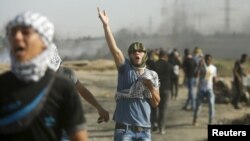Ask Israeli and Palestinian analysts what triggered the latest spate of violence and you can expect conflicting answers.
“That would be the end-of-July burning of the Dawabsheh family’s house in the West Bank town of Duma,” said Palestinian human rights lawyer Diana Buttu. “That’s when the 18-month-old baby was killed and then its parents died over the next three weeks.”
But Israeli political analyst and Knesset insider Jeremy Man Saltan cites a different catalyst.
“The October 1 murders of that Israeli settler couple, Eitam and Naama Henkin, who were gunned down while driving in a car with their four children,” Saltan said. “But you also had a situation where the Jews were asking why there’s no freedom of religion at the third most holy site in Islam and the first holy site for the Jews.”
He was referring to the east Jerusalem site called the Temple Mount by Jews and the Noble Sanctuary by Muslims. For more than a thousand years under the Ottomans, Jews were forbidden to go there.
After Israel captured Jerusalem in the Six-Day War in 1967, Israel agreed to maintain the status quo on Jews not praying there.
Frustrated youth vs organized attacks?
Recent years have seen an increase in Jewish visitors, partly in response to calls by hardline Jewish groups demanding equal access. The Temple Mount Faithful, a fringe religious-nationalist group, has called for destroying al-Aqsa mosque and building a third Jewish temple.
Israeli Prime Minister Benjamin Netanyahu insists he does not intend to change the status quo. But Palestinian youths are unconvinced and have repeatedly barricaded themselves inside the mosque, hurling stones and Molotov cocktails at police, who have responded with tear gas and rubber bullets.
Neither Israeli nor Palestinian analysts are surprised by the uptick in violence.
“All of the ingredients have been there for some time, something religious for it to turn into something bigger,” said lawyer Buttu, adding that there seems to be a new intifada for every new generation of Palestinians living under Israeli military rule.
“This generation knows that it’s not normal to have to seek an Israeli permit to go see Jerusalem or go see the city,” Buttu said. “Or that they can’t build a home or that homes are being demolished. This is a generation that is very aware of its rights, and it’s also a generation that’s been seeing, particularly over this last summer, that Israeli settlers do whatever they want with complete impunity.”
She denies that recent Palestinian attacks have been coordinated. "The Palestinian Authority is a government that can barely organize a demonstration,” she said, reflecting Palestinian frustration with the current leadership.
But Saltan believes the attacks are not only being encouraged by the Palestinian Authority, but orchestrated by Hamas and other Islamic groups.
“Not everything here is a lone-wolf attack,” he said. “People in Hamas are actually sending people to go ahead and commit terrorist acts. They’ve actually even taken responsibility for a few of them, such as the Henkin murder.”
Saltan believes that Palestinians have long been looking for an excuse for another intifada, calling the issue of the Temple Mount “convenient.”
“It’s been very beneficial to the narrative that the Palestinians are trying to put forth: Something that has a religious element, a cause that helps them bring sympathizers that are Muslims from all around the globe,” he said.
Israeli crackdown
Sari Bashi, the Israel/Palestine Country Director for Human Rights Watch, sees the violence as a natural result of a conflict that has gone unsettled too long. And she is concerned that an Israeli crackdown could further inflame tensions.
“I think the spate of attacks against Israeli citizens would be a challenge for any police force. But the measures that were recently adopted by the cabinet are unlawful and unwise,” she said.
The Israeli cabinet this week approved boosting police numbers in cities across Israel, as well as setting up security checkpoints between Arab and Israeli neighborhoods in east Jerusalem. Israel will also deploy non-combat soldiers to help police in Israel, in the West Bank and along the Gaza fence. Netanyahu has also approved revoking Jerusalem residency permits of Palestinian attackers, something which will have to be approved by Israel’s Attorney General.
“Collective measures that paint all Palestinians as suspects are inconsistent with Israel’s obligations under international law,” said Bashi. “And given the history of mistrust between police and Palestinians in East Jerusalem, it doesn’t seem to be very wise law enforcement.”




